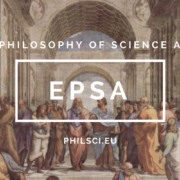Submitted by Niels Martens (RWTH Aachen University).
CFR: Dark Matter & Modified Gravity Conference
Dark Matter & Modified Gravity Conference
6-8 February 2019
Aachen, Germany
Call for Registration (deadline 13 January 2019)
www.lhc-epistemologie.uni-wuppertal.de/dm-mg
The Research Unit “Epistemology of the LHC” invites students and other scholars in philosophy, history and sociology of physics/science, as well as in physics, to register for the conference “Dark Matter & Modified Gravity”, taking place from 6 to 8 February 2019 at RWTH Aachen University, Germany.
INTERDISCIPLINARY PERSPECTIVES ON THE UNDERDETERMINATION BETWEEN DARK MATTER & MODIFIED GRAVITY
Astrophysical and cosmological observations as well as explanatory gaps in the Standard Model of particle physics imply the existence of Dark Matter and/or a modification of our theory of space and time. A decision between the Dark Matter (DM) and Modified Gravity (MG) approaches is hampered by problems of underdetermination at different levels and of different kinds. The plethora of Dark Matter and Modified Gravity approaches, and the corresponding underdetermination, even in the light of the vast amount of relevant collider based and astrophysical observations, clearly illustrates the complexity of this scientific problem. On the other hand, the overlap of the collider and astrophysical domains may allow for reducing the underdetermination, thus leading to a simplification of the model landscape. One focus of this conference is Dark Matter searches at the Large Hadron Collider and the connection between LHC results and theories of gravity. We will address the question of different kinds of underdetermination, both in choosing between the two research programs of Dark Matter and Modified Gravity, and also in choosing between different models within each program. In particular, we aim to provide an assessment of the explanatory power and the explanatory gaps of the Dark Matter and Modified Gravity hypotheses, and the extent to which these might reduce the issues of underdetermination.
Research topics include, but are not limited to:
-Is a strict conceptual distinction between DM and MG justified? How does this relate to the distinction between matter and spacetime?
-What are the explanatory successes and failures of the DM research programme, and of the MG research programme? Which models of explanation are being employed by the respective programmes, and how do those relate?
-Sociology of the DM-MG debate
-How do data, constraints and explanations at the LHC, in astrophysics and cosmology relate? Could the LHC, in principle, confirm dark matter by itself?
-Virtues and vices of simplified (dark matter) models. Do simplified models explain?
-Hybrid models, fifth forces & exotic theories that are neither MG nor DM
-Connections between dark energy and DM/MG
-Novel predictions, fine-tuning and falsifiability
CONFIRMED SPEAKERS
Physics:
Tessa Baker, University of Oxford (UK)
Lasha Berezhiani, Ludwig-Maximilians-University Munich (Germany)
Felix Kahlhoefer, RWTH Aachen University (Germany)
Julien Lesgourgues, RWTH Aachen University (Germany)
Stacy McGaugh, Case Western Reserve University (USA)
Mordehai Milgrom, Weizmann Institute of Science (Israel)
Tobias Mistele, Frankfurt Institute for Advanced Studies (Germany)
Robert Sanders, University of Groningen (The Netherlands)
Philosophy:
Erik Curiel, Black Hole Initiative, Harvard University (USA)
Michela Massimi, University of Edinburgh (UK)
Niels Martens, RWTH Aachen University (Germany)
David Merritt, Rochester Institute of Technology (USA)
Robert Rynasiewicz, Johns Hopkins University (USA)
History:
Jeroen van Dongen, University of Amsterdam (The Netherlands)
Jaco de Swart, University of Amsterdam (The Netherlands)
Contributing speakers:
Siska de Baerdemaeker, University of Pittsburgh (USA)
Indranil Banik, University of Bonn (Germany)
Nora Mills Boyd, Siena College (USA)
Marc Holman, Rotman Institute of Philosophy, Western University (Canada)
Abhishek Kashyap, Indian Institute of Technology Bombay (India)
Marcel Pawlowski, Leibniz-Institut für Astrophysik, Potsdam (Germany)
Manus Visser, University of Amsterdam (The Netherlands)
REGISTRATION
The organising committee invites participants from physics and from philosophy, history and sociology of physics/science, as well as anyone else who may be interested. In order to register for this conference, please email your name and affiliation to martens@physik.rwth-aachen.de by 13 January 2019. Registration is free. (Note that the deadline for abstract submissions has passed.)
ORGANISATION & CONTACT
This conference is organized by the project “LHC and Gravity” within the interdisciplinary, DFG-funded research unit “Epistemology of the LHC”. For further information, eg. regarding practicalities and the schedule, see the conference website: www.lhc-epistemologie.uni-wuppertal.de/dm-mg,
or contact the organisers:
-Niels Martens (RWTH Aachen University) martens@physik.rwth-aachen.de
-Dennis Lehmkuhl (University of Bonn) dennis.lehmkuhl@uni-bonn.de
-Michael Krämer (RWTH Aachen University) mkraemer@physik.rwth-aachen.de
-Erhard Scholz (University of Wuppertal) scholz@math.uni-wuppertal.de
-Miguel Ángel Carretero Sahuquillo (University of Wuppertal) carreterosahuqu@uni-wuppertal.de
















